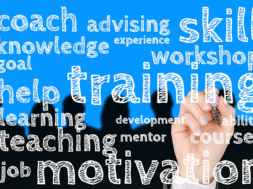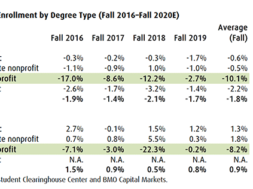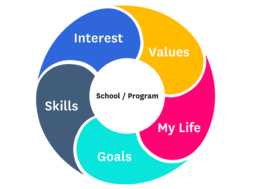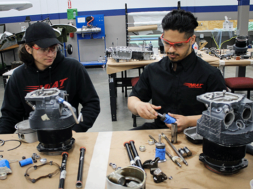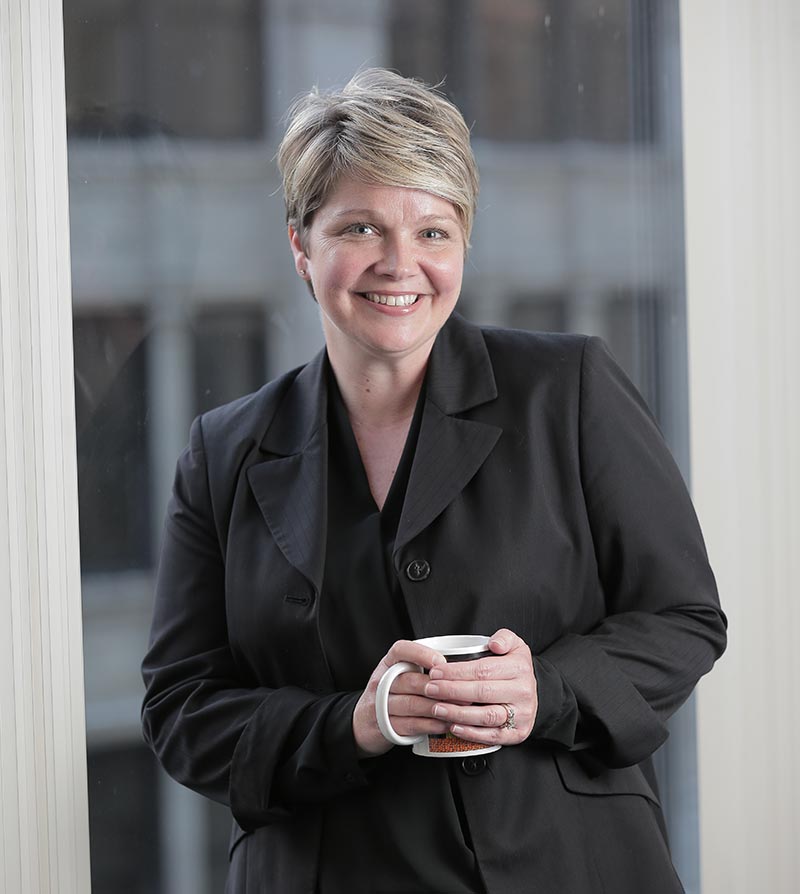
Growing Your High School Population – Insights from the Counselor’s Office
By Shannon Gormley, Licensed School Counselor, Tinley Park High School and Executive Director, Association for the Advancement of the College Admissions Profession (AACAP)
Setting the stage for career and technical education
Over the past decade, the “college-for-all” movement has swept across America, stemming from the premise that all children in our country need a strong academic foundation. However, the “college-for-all” concept morphed into the idea that all children need to be prepared to attend a four-year college (Symonds, Schwarz & Ferguson, 2011). And while this notion was taking hold, career and technical education started to be viewed as outdated. This couldn’t be farther from the truth.
In his co-authored report, Pathways to Prosperity, Robert Schwartz talks about the need for the ‘college-for-all’ rhetoric to be broadened to a ‘post high school credential’ for all (2011). It’s true – not all students benefit from the traditional four-year path; however, continued education, certification, and training must be part of post-secondary planning for all students.
Education and career development advocates agree that it’s important to boost the percentage of Americans with some form of post-secondary degree or training across the board (Symonds, et al., 2011). To that end, it’s time to develop more academic and vocational strategies for boosting post-secondary credentialing completion rates.
In fact, in the 2015-2016 school year, AASA, The School Superintendents Association, launched Redefining Ready!, a national initiative designed to introduce new research-based metrics to assess that students are college ready, career ready, and life ready.
This initiative was created as a response to dismal college and career readiness scores reported by standardized test makers which fail to portray a comprehensive picture of student potential (www.redefiningready.org, 2018). Research indicates that there are numerous factors that can significantly and more authentically demonstrate college, career, and life readiness. Some of these additional factors include FAFSA completion, enrollment in career pathways course sequence, participation in workplace learning experiences, attainment of an industry credential and many more.
In addition to Redefining Ready!, the Every Student Succeeds Act (ESSA) reauthorizes the 50-year-old Elementary and Secondary Education Act (ESEA), the nation’s national education law. ESSA seeks to improve K-12 schools and create more holistic school systems to measure school quality or student success – without losing sight of academic achievement (www.ed.gov/k-12reforms/standards, 2018). There is little doubt that today’s students need to be prepared to compete in a world that demands more than just basic skills. The U.S. Department of Education and constituents have called for reforms in education to ensure students succeed in our incredibly complex and connected world (2018).
And to that end, states across the country have submitted revised college and career readiness frameworks to the Department of Education to demonstrate the work that will be done with students throughout their high school careers to ensure college and career readiness indicators are met upon graduation. One such framework is the Illinois PaCE which outlines expectations for post-secondary and career expectations with indicators encompassing three areas:
- Career exploration and development
- Post-secondary education, exploration, preparation, and selection
- Financial aid and literacy
Illinois’s framework begins before the end of eighth grade which highlights the importance of having college and career-related discussions and activities before students even begin high school (www.isbe.net/Documents/PaCE_Revisions.pdf, 2018). This framework presents a tremendous opportunity for colleges and schools to become a trusted resource for counselors, students, and schools to assist in the development of the students individualized learning plan to achieve college and career readiness.
So, what makes now the right time for such partnerships? As school districts work to provide opportunities to ensure their students college and career readiness, partnering provides opportunities for professionals to build trust with students and their families, schools and the community at large by providing meaningful interactions and career-related experiences. All students must participate in career exploration regardless of their post-secondary plan, and that process begins early in a student’s academic career. To offer a perspective from the other side of the desk, Shannon Gormley, school counselor at Tinley Park High School and Executive Director of the Association for the Advancement of the College Admissions Profession (AACAP), provides insights as to what can assist in building effective partnerships with high school counselors.
Q: Tell us a little about your background with career education.
A: My career started as a college admissions counselor with a private college in Illinois – and I fell in love with the job! Helping students and their families make decisions regarding college and career plans was, and still is, one of the most rewarding aspects of my work. The college that I worked for focused on applied education, preparing students at an accelerated pace for careers in healthcare, information technology, and culinary arts. The programs were extremely hands-on, which our students appreciated, as it catered to their learning style and the accelerated pace helped them move into their careers sooner. I’ve also had the incredible opportunity to work with many admissions professionals across the country while delivering the EnrollMatch training program.
Many of those admissions professionals have worked in career education, and their passion for helping students achieve their career goals is evident.
As my career progressed, I decided that I wanted to start helping students and their families even earlier. Becoming a school counselor has allowed me to do just that! My background in college admissions has contributed to my ability to help students in determining a clear post-secondary path, whether a traditional four-year college or career training that allows them to be in the workforce faster.
Q: What do counselors feel are the major benefits that career colleges provide?
A: Some of the major benefits that I see with career colleges include the hands-on experience offered throughout the curriculum, experienced faculty that brings their professional practices to the classroom, and the shorter time frames offered for program completion. I also believe that the people working at career colleges provide a major benefit to students. The personal attention that students receive from admissions, financial aid, academics, and career services is a big deal. That level of helpfulness instills a belief that their students will have the necessary guidance and assistance to successfully transition from high school to college and career. This is especially important for our first generation and lower-income students that don’t necessarily have the experience or available resources to navigate the ins and outs of the process. I have had the privilege of meeting incredibly dedicated and committed professionals working at a number of career colleges and schools throughout the years. Those individuals have displayed a great deal of passion, energy, and devotion to helping students realize their potential and achieve their goals in life. That’s extremely important to me as a counselor.
Q: How do you determine what schools to guide students to when they are not sure and do not want to go away to college?
A: Traditionally, when we’re working with students to determine their college and career paths, we focus on helping students to understand their interests, skills, and values related to what they’re looking to do after graduation. It’s important that students understand who they are, what they’re good at, and what’s important to them in relation to post-secondary planning. We use a number of assessments to explore those specific areas and tools like Career Cruising, to help students determine a number of options for careers they might be interested in pursuing. These tools allow students to look for colleges and schools that can provide the education necessary to enter a specific career field. Of course, we look at the courses taken to see how they align with post-graduation plans, grades earned, and test scores too! This process begins as early as freshman year and continues through the student’s high school journey. Beginning junior year, we conduct interviews with students and their parents to discuss college and career plans to elicit input from all parties. We’ll then conduct a follow-up interview with students at the beginning of senior year to build their post-secondary plan for the student to work on throughout the year to ensure a successful transition. We’ll also offer field trips and activities that allow students to experience a variety of settings, such as college visits, job shadowing, and workplace learning trips.
Q: What are your thoughts regarding admissions professionals visiting schools/classrooms?
A: I love having admissions professionals visit our school. I think it’s important that students get the opportunity to connect directly with your college or school and the best person to do that is the admissions professional! That being said, I can appreciate how increasingly difficult it has become to get those visits scheduled. My advice, reach out to the Student Services secretary to find out about the college visit program and how you can get on the calendar for the upcoming school year. Many schools start planning the calendar for the next year as early as March. You can also find out about special events at the high school, such as Career Days, College Fairs, parent presentations, College Nights, etc. that you could attend. Counselors are always looking to invite the college and career experts to come in and share information to students and their families. Getting into the classrooms is another story. Class time is a valuable commodity – it’s difficult for us counselors to get into classes to deliver lessons. You can understand why, of course. Teachers only have so much time with their students and have a great deal of curriculum to cover.
My advice in this instance would be to take the time to get to know the teachers and administrators that are part of the school’s career and technical education department.
These individuals may be looking for presenters that can add to the curriculum that they are teaching and bring in your faculty to present to students regarding certain career paths.
Q: It’s difficult to get to the counselors at some of our districts – what do you suggest schools do to make headway?
A: Organize counselor events that bring us to your campus to see what you have to offer. This is a great way to expand our knowledge base about your programs as well as gain an understanding of careers that are typically the end result of completing those programs. Having food is always a plus! Many colleges and universities host counselor events at area restaurants to share information and bring counselors together. Offer field trips, for students and counselors to come and experience your campus, with hands-on activities, especially if you offer specialized or highly sought after programs. Let them meet your faculty and talk to current students. Bonus points if you have alumni from the high schools that are participating and attending the event, they embody living proof that what you’re doing at the school works! Get involved with professional organizations that allow you to expand your professional network and share best practices. The Association for the Advancement of the College Admissions Profession (AACAP) is a membership organization that brings together admissions and counseling professionals that serve students pursuing career education. AACAP plays an important role in connecting, educating, developing, and informing counseling and admissions professionals in career and technical education to align standards of excellence, compliance and best practices to ultimately serve students to the highest degree. Membership offers you a variety of resources to increase your knowledge base such as educational webinars, newsletters, an annual conference, and an admissions professional credential – coming soon! The organization is inclusive and provides access to all organizations and individuals working in secondary and post-secondary education. For more information on how to become a member, visit www.advancingadmissions.org or contact us at 312-502-0393.
Q: Some districts and schools have policies preventing for-profit schools from visiting. What suggestions do you have to help build relationships with these schools, especially with the pushback of for-profit colleges?
A: It honestly comes down to taking the time to develop relationships with key stakeholders at the school and district level. Attend events in your community and get to know those people – administrators, parents, influencers. Share your story and mission and make it relevant for the individual you’re speaking to. It can’t be a one-size-fits-all approach. And be prepared to offer evidence and data to demonstrate your success. For example, tell them about the number of graduates that are working in the community, discuss resources you can offer to fill a need for the school and students, invite stakeholders to your events. Show these individuals the good work that you’re currently doing as a contributing member of the community.
Q: What outreach/resources are you looking for to show the benefit of CTE programs?
A: Counselors work with students to determine “career clusters” that they may be interested in pursuing. A career cluster is a grouping of jobs and industries that are related by skills or products. Within each cluster, there are “pathways” that correspond to a collection of courses and training opportunities to prepare you for a given career. It’s always helpful when we can see how programs link to specific career paths and industry credentials or certifications.
References:
About Us. (n.d.). RedefiningReady!. Retrieved June/July, 2018, from https://www.redefiningready.org/
Career Clusters. (2018). State of Washington Office of Superintendent of Public Instruction. Retrieved June 2018, from http://www.k12.wa.us/CareerTechEd/clusters
College- and Career-Ready Standards. (2018). U.S. Department of Education. Retrieved June 2018, from https://www.ed.gov/k-12reforms/standards
Illinois PaCE Postsecondary and Career Expectations. (2018). Illinois State Board of Education. Retrieved May 2018, from https://www.isbe.net/Documents/PaCE_Revisions.pdf
Symonds, William C., Robert Schwartz, and Ronald F. Ferguson. 2011. Pathways to prosperity: Meeting the challenge of preparing young Americans for the 21st century. Cambridge, MA: Pathways to Prosperity Project, Harvard University Graduate School of Education. https://www.gse.harvard.edu/sites/default/files/documents/Pathways_to_Prosperity_Feb2011-1.pdf
SHANNON GORMLEY began her career in higher education 17 years ago as an Admission Counselor. Since then, she has served in the role of Student Activities Director, Student Advisor, Director of Admissions, and Executive Director of Graduate Recruitment. Shannon went on to work in admissions training, serving as the Director of Training and EnrollMatch® Master Facilitator. She has worked extensively with Dr. Jean Norris in the development of EnrollMatch®, a comprehensive admissions training program offering proven results to balance compliance and outstanding performance.
After receiving her Master’s degree in School Counseling, Shannon moved into secondary education as a school counselor, assisting students in the development of their academic, social, and career pursuits, with a focus on college and career readiness. She earned her bachelor’s degree from the University of Wisconsin-La Crosse and her Master of Arts in School Counseling from Lewis University and is a licensed school counselor with the state of Illinois.
Contact Information: Shannon Gormley // Licensed School Counselor, Tinley Park High School // Executive Director, Association for the Advancement of the College Admissions Profession (AACAP) // 312-502-0393 // sgormley@advancingadmissions.org // http://advancingadmissions.org

